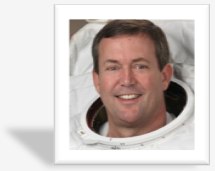 NASA Explorer Schools would like to extend an invitation to K-12 students across the United States to participate in a webchat with astronaut and veteran spacewalker Mike Foreman. The event will take place from 1 to 2 p.m. EST on Nov. 22, 2010. Foreman will answer questions about his spacewalking experiences, living and working in the microgravity environment of space, and his unique career path from high school through astronaut training.
NASA Explorer Schools would like to extend an invitation to K-12 students across the United States to participate in a webchat with astronaut and veteran spacewalker Mike Foreman. The event will take place from 1 to 2 p.m. EST on Nov. 22, 2010. Foreman will answer questions about his spacewalking experiences, living and working in the microgravity environment of space, and his unique career path from high school through astronaut training.
For more information go to the information page on the NES Virtual Campus.
Link to the NES Virtual Campus website.

I REALLY LIKE WHAT YOU DO AND I HAVE BEEN WATCHING YOU ON THE MISSION 26 IT LOOKS FUN BUT REALY HARD. I WANT TO BE LIKE YOU(A ASTRONORT)WHEN I GROW UP.
THANK YOU.
P.S. HAVE YOU GOT EANY TIPS FOR ME BECAUSE IT WOULD BE VEARY USEFULL TO ME WHEN I AM OLDER.
NEXT YIME YOU ARE IN ORBIT COULD YOU SEN ME A PHOTOGRAPH
THAT WOULD BE COOL.THANKS MATE.:)
Do persons wearing powered spex can be an astronaut candidate?
I would like to learn how can i be astronaut
If you ever wondered if you have what it takes to become a NASA Astronaut, read the information at https://www.nasa.gov/audience/forstudents/postsecondary/features/F_Astronaut_Requirements.html
Hello Mr. Foreman
i was in my science class in school the other day and i got curious about something: if someone were to bring an empty water bottle to space, open it and let space-air into it; close it and then bring it to earth- what would be in the bottle?
Q: On Mar 05, 2011 01:04:30 PM andrea t wrote:
Hello Mr. Foreman
i was in my science class in school the other day and i got curious about something: if someone were to bring an empty water bottle to space, open it and let space-air into it; close it and then bring it to earth- what would be in the bottle?
A: On Feb 28, STS-133 astronauts Stephen Bowen and Alvin Drew opened and “filled” a Japanese-designed metal cylinder with space — or rather the vacuum of outer space — and then sealed it to be brought back to Earth with space shuttle Discovery. Search the Internet for “Space in a Bottle” to learn more about this activity.
Is there any type of powder on the moon? IF THERE is what would happen if you mix it with water?????? IM a curious boy. YEEE HAAA
Q: Is there any type of powder on the moon? IF THERE is what would happen if you mix it with water?????? IM a curious boy. YEEE HAAA
A: Lunar soil or more appropriately lunar regolith is made of pulverized rocks and some melted glass fragments. Lunar regolith consists of small fragments of rocks, some of the minerals that make up the rocks, and some glass. The pulverizing happened when meteors struck the moon, broke the rocks and minerals, and formed glass when some of the rocks melted from the energy of impact. The basic rocks of the moon are volcanic basalt and anorthosite, an igneous intrusive rock made mainly of plagioclase feldspar, a very common rock forming mineral. So you should not expect lunar regolith to behave differently than Earth soil that is made mainly of rock fragments. Soils on Earth are formed from forces of weathering and erosion and also contain organic matter from plants and animals.
In water, the lunar simulant behaves like any very fine material made of mainly silicate minerals – the larger fragments sink quickly, the very fine particles stay suspended for a while and eventually sink also. Sand with different size particles would do the same in water. The minerals in Texas clay would behave differently – the clay particles would incorporate water in their crystal structure and swell – but would also settle to the bottom if there is enough water. Minerals are generally more massive than water and sink.
Below is the link to the Exploring the Moon Educator Guide
https://www.nasa.gov/audience/foreducators/topnav/materials/listbytype/Exploring.the.Moon.html
Link below is to NASA JSC Curation – Lunar Sample Compendium – click soil – click on numbers for some info and pictures.
http://curator.jsc.nasa.gov/lunar/compendium.cfm
I like nasa
how wilL be in BLACKHOLE?
i planet x real
Since NASA is exploring space I thought asking an astronaut would be the best way to answering a few questions.
What resources will you be looking for?
What knowledge will you obtain?
How will these resources and knowledge be used?
How will these resources and knowledge benefit Canada and Canadians?
If you could answer these that’d be great thanks so much for helping, bye!
i need to interview someone for a 7th grade english project. my project is about earth. if posable can i interview u today.
nasa is a good way to know about space
What are 50 things you need to survive on mars or the moon?
i think learning sience is fun. what do you think